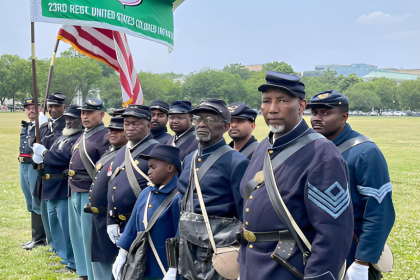APRILTEENTH: Arkansas’ Juneteenth is April 14th 1865 (The Day Its Enslaved Citizens were Emanipated)
By Edmond W. Davis
In 2025, Juneteenth turns 160 years old. Officially recognized as a federal holiday in 2021—becoming America’s 11th national observance—Juneteenth commemorates one of the country’s oldest and most painful pursuits: the fight for tangible, equitable, and lasting freedom.
Most Americans now know that Juneteenth marks June 19, 1865, when Union troops led by Major General Gordon Granger arrived in Galveston, Texas, to enforce the Emancipation Proclamation—more than two years after President Lincoln issued it. That delay wasn’t due to slow communication; it was the result of intentional obstruction. Slaveholders deliberately withheld liberation, wringing out every last drop of unpaid labor until federal troops intervened.
But Texas wasn’t the only state that stalled. Emancipation in America unfolded unevenly. In fact, many states have their own emancipation dates—days when freedom became real in their borders. And for Arkansas, that day was April 14, 1865—the same day President Lincoln was fatally shot at Ford’s Theatre. In the Natural State, some now call that day Aprilteenth.
Governor Isaac Murphy, Arkansas’s first Reconstruction governor and a staunch Unionist, oversaw the drafting of a new state constitution in 1864 that abolished slavery. By April 14, 1865, as Confederate power collapsed, freedom was finally enforced across Arkansas. Enslaved Black Arkansans—held in bondage even in defiance of Lincoln’s proclamation—were now legally and physically free.
While Juneteenth has rightly become a national symbol of delayed justice, Aprilteenth represents Arkansas’s own emancipation milestone. This day predates Texas’s liberation and aligns with the final hours of Lincoln’s life. That symbolism should not be lost.
Arkansas isn’t alone in having its own “freedom day”:
- Kentucky observes Augusteenth (August 8).
- Delaware didn’t ratify the 13th Amendment until 1901—a shocking 36 years after its passage.
These state-specific dates matter. They remind us that emancipation wasn’t an overnight event. It was a long, patchy, and often reluctant process.
From March 3 to December 6, 1865, the U.S. experienced a cascade of transformational moments, arguably the most important 9 month stretch in U.S. history:
- March 3 – The Freedmen’s Bureau was created.
- April 9 – Robert E. Lee surrendered at Appomattox.
- April 14 – Lincoln was assassinated—and Arkansas’s enslaved people were freed.
- June 19 – Texas celebrates Juneteenth.
- December 6 – The 13th Amendment was ratified.
These nine months reshaped America—and still ripple across generations.
Freedom was not only a political act; it was a culinary and cultural rebirth, especially among African Americans. Across Arkansas and Texas, red velvet cake, hibiscus tea, watermelon, spicy sausage, and barbecue serve as more than food—they’re symbols. Red, in West African culture, represents blood, sacrifice, and transformation. That’s why it remains central to Juneteenth and Aprilteenth tables.
When we pass sweet potatoes, greens, or fried chicken, we also pass down stories—of survival, of struggle, of hope.
Juneteenth isn’t just about Galveston. And Aprilteenth isn’t just about Arkansas. Both tell the story of a nation fighting to define freedom—state by state, year by year, person by person.
So as Juneteenth turns 160, let’s honor Arkansas’s Aprilteenth—a local emancipation moment with national significance. Freedom didn’t come with fanfare. It came with resistance. And it still demands our vigilance today.
These aren’t just commemorations. They are recommitments.
✅ 2. Printable Teaching Handout / Bulletin Format
Great for classrooms, museums, Juneteenth events, or church bulletins. You can title it:
APRILTEENTH: Arkansas’ Own Emancipation Day
(April 14, 1865 — A Full Day Before Lincoln Was Assassinated)
� � Did you know? While Juneteenth is nationally celebrated on June 19, Arkansas freed its enslaved population earlier, on April 14, 1865. Some historians & scholars like yours truly call this day, Aprilteenth.
� � What Happened on April 14th?
- Governor Isaac Murphy, a Unionist and abolitionist, oversaw Arkansas’s 1864 state constitution that abolished slavery.
- Enslaved Black Arkansans were liberated on April 14, 1865, when Union enforcement and political restructuring made freedom real in Arkansas.
- This date is one day before President Lincoln was assassinated.
� � Why It Matters:
- Freedom in America came in waves, not all at once.
- Arkansas’s Aprilteenth, Kentucky’s Augusteenth, and Delaware’s Decemberteenth are powerful reminders of regional emancipation timelines.
- These milestones highlight that justice was delayed in many places, sometimes by years.
� Food, Freedom, and Culture: Juneteenth & Aprilteenth meals share deep African-American culinary traditions:
-
- Red foods (red velvet cake, hot links, hibiscus tea) = blood, sacrifice, joy
- Barbecue & soul food staples = resistance, survival, celebration
- Sugar-based drinks & desserts = reclaiming joy from a bitter history

















